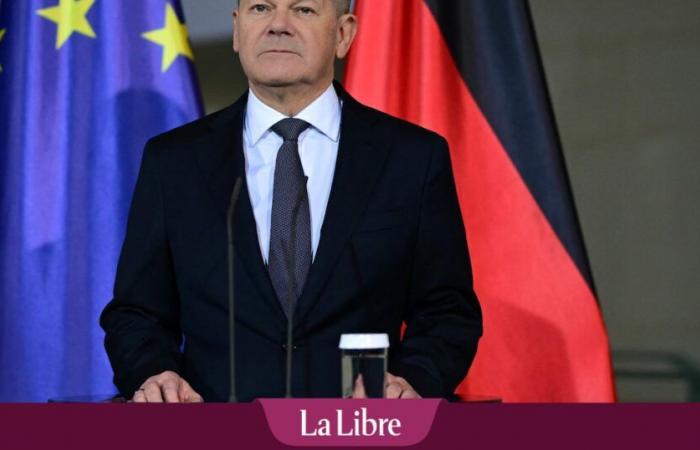Without a tie, relaxed, a handshake and a friendly word for everyone, he said he was proud of the “important decisions“taken since 2021, in difficult times marked by the Russian invasion of Ukraine and its enormous consequences on the country’s energy supply. He also says he is convinced of having “well done” by dismissing his liberal finance minister, Christian Lindner, a month ago, and putting an end to the ordeal that this tripartite coalition, the first in German history, had become.
What awaits Germany in crisis in the coming months
“The worst chancellor in history”
If the chancellor tries to see the loss of his majority as a deliberate and thoughtful act, in opposition on the contrary, we are shooting at a chancellor described as “worst in the history of the country“by the extreme right.”Olaf Scholz obviously failed in his mission because he was elected for four years and only lasted three. notes journalist Lars Haider, journalist and author of a biography of Olaf Scholz. “In reality, he was chancellor at the wrong time. He inherited a Germany which for two years had stagnated in terms of economic growth, had barely emerged from the corona pandemic and, in addition, had to face the war in Ukraine which called into question the model of success on which the country was based on. Namely: security supported by the United States and inexpensive energy from Russia. Added to this is the challenge of holding together a three-way coalition, with two partners with very divergent interests. One thing is certain, Olaf Scholz will go down in history as the chancellor of a period of upheaval and war but it is too early to say whether he failed in his action..
The far right confirms its roots in eastern Germany: “The campaign was marked by fear”
With more than two months before the early elections, it is clear that Olaf Scholz has little chance of being re-elected chancellor. According to various opinion surveys, his party is credited with only 16% of voting intentions, fifteen points behind the Christian Democrats (CDU/CSU) of Friedrich Merz and behind the far right of the AfD. As for his popularity rating, it hits the ground running.
Unsurprisingly, the mood is therefore one of moderate optimism in the ranks of the SPD. “As young social democrats, we have always been very critical of Olaf Scholz’s mandate, but he worked in complicated conditions and showed leadership even if he was perceived as too restrained. We are ready to fight and are reasonably optimistic about the outcome of this election. Already in 2021, no one thought we were winners and yet we came first. Our strength is our program. We can convince voters by ensuring a fair future” believes the young man.
A “letter of divorce” shakes up the German government
The moderation card
Now on the electoral campaign, Olaf Scholz is playing the “moderation” card, facing a more maximalist right-wing opposition on the Ukrainian question. His credo: continue to support Ukraine without playing the escalation card, and therefore without delivering long-range missiles capable of hitting Russia. For Olaf Scholz, we must also continue to support Ukraine without cutting back on the state budget in terms of social spending and investments in future infrastructure. He therefore advocates tax increases and above all a reform of the very strict debt brake rule. “We don’t want an “either one or the other”“, he repeats over and over again, accusing the right-wing opposition of wanting to cut social budgets.
Chancellor Olaf Scholz on surprise visit to Ukraine
At 66 years old, Olaf Scholz is in any case playing double or nothing. If his party does not reach first place on February 23, his personal career will end. He confirmed this week that he did not want to be a minister or vice-chancellor in a government led by Christian Democrat Friedrich Merz. “He wanted to be chancellor, he was” recalls journalist Lars Haider. “It’s already a success. Not everyone made it“.






